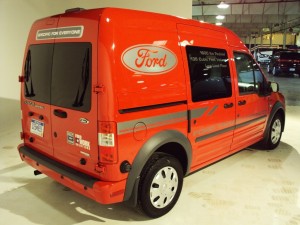
Sales of the Ford Transit Connect nearly doubled in September, suggesting a recovery on the small business side of the economy, Ford Marketing Chief Jim Farley said.
What seemed likely to be, at best, a mediocre month has turned out to be an unexpectedly solid sign pointing to a recovery of the struggling U.S. auto market, industry experts and analysts say.
Detroit makers, in particular, reported significant gains for September – Ford sales up 46%, year-over-year, Chrysler up 61% — but, with rare exception, the entire industry seemed to have gained momentum during the final portion of the month, according to those who track dealer activity.
In fact, Audi’s record September volume helped it report an all-time record for the entire third quarter. Japanese maker Subaru also announced it had set an all-time September sales record, gaining 47% compared to the same period a year ago.
In an exclusive interview at the Paris Motor Show, Ford Global Marketing Director Jim Farley told TheDetroitBureau.com that he is “encouraged with our performance” in September. All the more significant, he stressed, was what Ford saw on the light truck side of the business. Its Transit Connect van, for example, nearly doubled sales, mostly to small businesses. Echoed by similar numbers at other makers, the executive suggests “that is a sign small business is coming back.”
General Motors reported that it saw particularly strong demand for its new 2011 models, a particularly significant sign since September sales are often driven by hefty incentives designed to clear out the remaining inventory of the prior model-year. GM also said it was pleased to see that retail sales gained even more than its overall volume, which was up a more modest 10.5%.
Chrysler’s upturn is particularly important considering the huge crash it took as it entered bankruptcy in early 2009. Even the Cash-for-Clunkers program, that following summer, failed to do much to lift the maker’s fortunes.
But September marked Chrysler’s sixth month in a row of year-over-year increases, and the second time in 2010 it has sold more than 100,000 vehicles in a month.
On the Asian side, the world’s largest automaker saw a 16.8% increase in September but Toyota failed to outsell Ford for the seventh month in a row. Toyota had been in the number two slot in the American market for three years in a row but has been hurt badly by the safety scandal that erupted last October when it ordered the first of two major recalls for so-called unintended acceleration.
Toyota’s luxury brand, Lexus, which has had recall problems of its own, in recent months, actually posted one of the few industry declines for September, a 5.5% dip.
Honda, on the other hand, gained 26%, analysts suggesting the maker has been benefiting from Toyota’s ongoing problems.
Both Honda and (its luxury) Acura divisions have…significant momentum in the market,” declared the company’s top U.S. executive, John Mendel.
Yet another maker setting a September sales record was Hyundai, buoyed by the success of its Sonata midsize sedan. The company posted a 48% gain, while sibling Korean brand Kia was up 39%.
Nissan posted a 35% gain, more than twice the 16% increase it has recorded for the calendar year to date.
Mercedes-Benz, meanwhile, had its best month of the year, and its 22% gain for September let it outsell mainstream German rival Volkswagen, which itself reported a 15% increase for the month. The other big German maker, BMW, was up 20.5%.
But while some observers might be ready to crack open the champagne, Ford marketing chief Farley urged a more cautious perspective is needed before declaring September the end of a painful automotive recession that has seen sales dip by more than 40% from their mid-decade peak of more than 17 million to last year’s trough that fell below the 10 million mark.
“Things aren’t really as rosy as they seem on the surface,” Farley told TheDetroitBureau.com, “because Seotember 2009 was a hangover month.”
It was the first month to follow the completion of the so-called Cash-for-Clunkers government incentive program, he stressed, which meant September was one of the worst months of an already dismal 2009.
“Clunkers sucked the life out of the industry,” Farley stressed, so almost any gain this year would look good by comparison.
